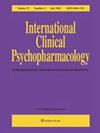评估非问题性酒精摄入对重度抑郁症结果的影响。
IF 2.1
3区 医学
Q3 PHARMACOLOGY & PHARMACY
引用次数: 0
摘要
轻度或中度饮酒对服用抗抑郁药物的重度抑郁症患者的疗效有何影响,这个问题至今仍未得到解答。本研究的主要目的是评估轻度或中度饮酒与单相重度抑郁症患者对药物治疗的急性反应(疗效和耐受性)之间的关系。采用前瞻性自然主义单盲设计,对重度抑郁症患者中的戒酒者、轻度饮酒者和中度饮酒者三个亚组进行了为期8周的疗效和耐受性分析比较。治疗策略改编自当地的临床指南。处方抗抑郁药包括艾司西酞普兰、文拉法辛缓释剂和丙咪嗪;必要时还可处方苯二氮卓类药物和抗精神病药物。最终样本包括 614 名 18 岁或以上的严重单相重度抑郁症住院和门诊患者。值得注意的是,禁酒亚组和非问题饮酒亚组在疗效或耐受性(包括所有评估的子评分)方面没有发现明显差异。总之,我们的研究结果表明,非问题性饮酒并不会影响急性重度抑郁发作患者的治疗效果。本文章由计算机程序翻译,如有差异,请以英文原文为准。
Evaluating the influence of nonproblematic alcohol intake on the outcome of major depression.
The effect of light or moderate alcohol intake on the outcome of patients with major depression taking antidepressants is a question that remains unanswered. The main objective of this study was to assess the association between light or moderate alcohol consumption and the acute response (efficacy and tolerability) to pharmacological treatment in unipolar major depression. Efficacy and tolerability analyses compared 8-week outcomes between three subgroups, abstainers, light drinkers and moderate drinkers, of patients with major depression using a prospective naturalistic single-blind design. The treatment strategy was adapted from a local clinical guideline. Antidepressants prescribed were escitalopram, venlafaxine extended-release and imipramine; benzodiazepines and antipsychotics could be prescribed as needed. The final sample consisted of 614 severe unipolar major depressive inpatients and outpatients aged 18 years or older. Notably, no significant differences in efficacy or tolerability (including all subscores assessed) were found between the abstainer and nonproblematic drinker subgroups. Without ever forgetting the serious implicit risks associated with the inappropriate use of alcohol, in conclusion, our results suggest that nonproblematic alcohol consumption does not influence the outcome of patients diagnosed with an acute severe major depressive episode.
求助全文
通过发布文献求助,成功后即可免费获取论文全文。
去求助
来源期刊
CiteScore
4.40
自引率
23.10%
发文量
97
审稿时长
>12 weeks
期刊介绍:
International Clinical Psychopharmacology provides an essential link between research and clinical practice throughout psychopharmacology. It reports on studies in human subjects, both healthy volunteers and patients, which relate the effects of drugs on psychological processes.
A major objective of the journal is to publish fully refereed papers which throw light on the ways in which the study of psychotropic drugs can increase our understanding of psychopharmacology. To this end the journal publishes results of early Phase I and II studies, as well as those of controlled clinical trials of psychotropic drugs in Phase II and IV. Other topics covered include the epidemiology of psychotropic drug prescribing and drug taking, the sociology of psychotropic drugs including compliance, and research into the safety and adverse effects of these compounds.

 求助内容:
求助内容: 应助结果提醒方式:
应助结果提醒方式:


